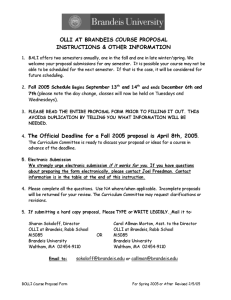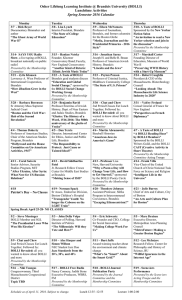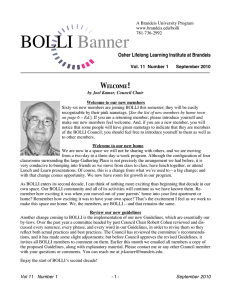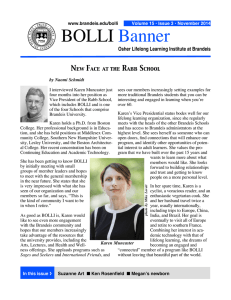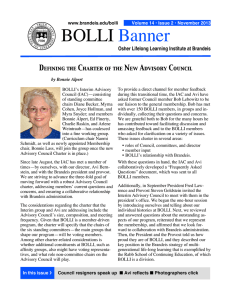BOLLI Banner G SGL, N
advertisement
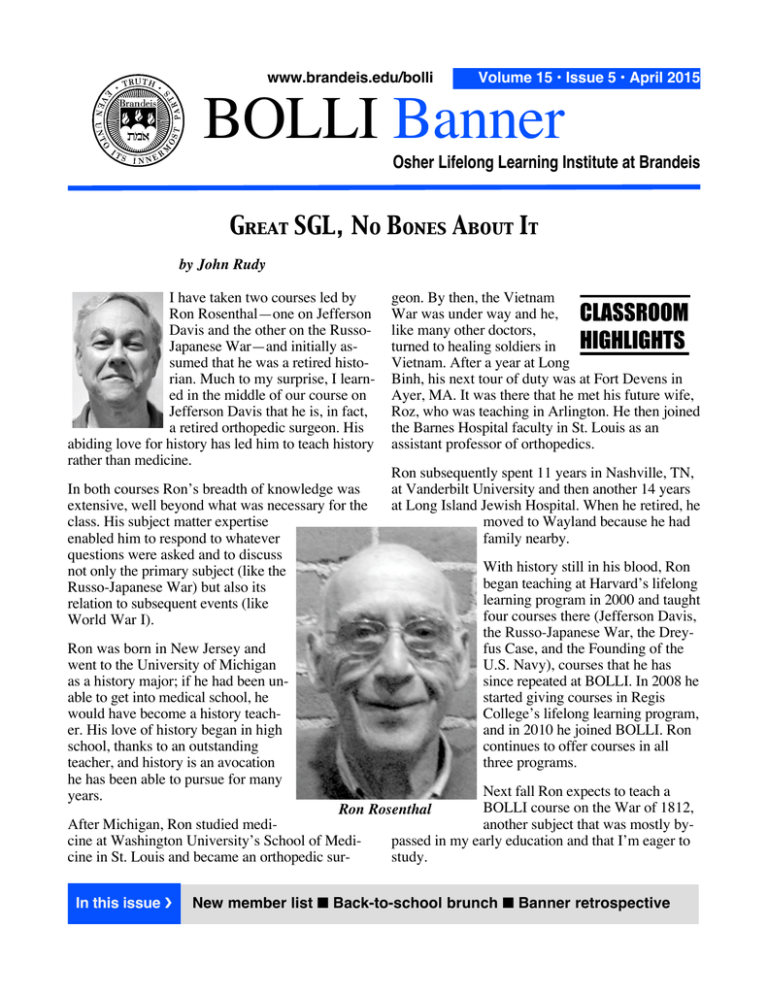
www.brandeis.edu/bolli Volume 15 • Issue 5 • April 2015 BOLLI Banner Osher Lifelong Learning Institute at Brandeis Great SGL, No Bones About It by John Rudy I have taken two courses led by Ron Rosenthal—one on Jefferson Davis and the other on the RussoJapanese War—and initially assumed that he was a retired historian. Much to my surprise, I learned in the middle of our course on Jefferson Davis that he is, in fact, a retired orthopedic surgeon. His abiding love for history has led him to teach history rather than medicine. In both courses Ron’s breadth of knowledge was extensive, well beyond what was necessary for the class. His subject matter expertise enabled him to respond to whatever questions were asked and to discuss not only the primary subject (like the Russo-Japanese War) but also its relation to subsequent events (like World War I). Ron was born in New Jersey and went to the University of Michigan as a history major; if he had been unable to get into medical school, he would have become a history teacher. His love of history began in high school, thanks to an outstanding teacher, and history is an avocation he has been able to pursue for many years. geon. By then, the Vietnam War was under way and he, CLASSROOM like many other doctors, HIGHLIGHTS turned to healing soldiers in Vietnam. After a year at Long Binh, his next tour of duty was at Fort Devens in Ayer, MA. It was there that he met his future wife, Roz, who was teaching in Arlington. He then joined the Barnes Hospital faculty in St. Louis as an assistant professor of orthopedics. Ron subsequently spent 11 years in Nashville, TN, at Vanderbilt University and then another 14 years at Long Island Jewish Hospital. When he retired, he moved to Wayland because he had family nearby. With history still in his blood, Ron began teaching at Harvard’s lifelong learning program in 2000 and taught four courses there (Jefferson Davis, the Russo-Japanese War, the Dreyfus Case, and the Founding of the U.S. Navy), courses that he has since repeated at BOLLI. In 2008 he started giving courses in Regis College’s lifelong learning program, and in 2010 he joined BOLLI. Ron continues to offer courses in all three programs. Next fall Ron expects to teach a BOLLI course on the War of 1812, Ron Rosenthal another subject that was mostly byAfter Michigan, Ron studied medipassed in my early education and that I’m eager to cine at Washington University’s School of Medistudy. cine in St. Louis and became an orthopedic surIn this issue New member list ■ Back-to-school brunch ■ Banner retrospective Who Are Our New Members? Auburndale Lucille Magnus Cambridge Peggy Creese Bedford Samuel Edelstein Lexington Sandy Bornstein Richard Van Wert Boston Lizabeth Shapiro Stephen Shapiro Brookline Judith Mir Newton Lois Biener Walter Carter John Alan Clark Jane Hyman Barbara Levy Paul Lipsitt Stefano Navarroli Leonard Solomon Lincoln Steven Perlmutter Needham Janice Burres Ellen Moskowitz Waltham Robert Berk John Hose Howard Loewinger Abby Pinard Sue Wurster Wayland Andi Bruell Maxine Weintraub Stoughton Jackie Anapolie Winchester Catherine Lord ♦♦The total membership for the spring semester is 360 ♦♦ Here is a glimpse at just a few of our newest members: Bob Berk taught statistics at Rutgers University. He speaks Hebrew and Yiddish and would like to start a Yiddish conversation group at BOLLI. Walter Carter plays trombone with several area groups, enjoys going to Metropolitan Opera performances in high definition, and has published a memoir about his father’s service in World War II. Sam Edelstein is a retired hospital administrator. As an officer in the U.S. Army during the 1960s, he was initially attached to NATO near Paris and afterward to a communications battalion in Vietnam. John Hose was the executive assistant to four Brandeis presidents. In addition to his regular duties, John provided academic counseling to undergraduates – a task he enjoyed immensely. He has a Ph.D. in history and co-authored the entry on Brandeis in the Encyclopedia of American Jewish History. Ellen Moskowitz is an artist, specializing in monotype printmaking, and taught art in the Boston public schools. Ellen already has a busy schedule of art and yoga classes, but her husband, David, has convinced her to take BOLLI classes as well. Maxine Weintraub is the author of humorous short stories and essays. She is a former neighbor of George and Barbara Bush near their home in Maine. The Bushes and their political friends provided material for some of Maxine’s writings. The BOLLI Banner is published by the Banner Committee: Richard Glantz, Publisher Brenda Gleckman, Special Projects Susan Posner, Archivist Barbara Rabinovitz, Co-editor Phil Radoff, Co-editor Andy Thurnauer, Secretary Telephone number for the BOLLI office is 781-736-2992 Len Heier, Photographer Bonnie Alpert, Advisory Council liaison Joan Kleinman, Contributing writer Banner archive: www.brandeis.edu/bolli/publications/banner/index.html Volume 15 Issue 5 -2- April 2015 Shoveling a Path Across Cultures by Sandy Traiger It was mid-February, the coldest part of the winter, snow up to the windows and higher. Harris and I were captives in our own home; he was recovering from recent shoulder surgery and was unable to drive. (The roads were impassable anyway.) We were literally snowed in. And two weeks earlier, our attic pipes had burst! challenges and dangers they have faced. These were stories we would never have read in the newspapers. INTERNATIONAL FRIENDS “So what can we do to help you now?” they asked. Throughout January and early February our kind, generous neighbors had plowed us out and shoveled our walks, but recent snows had added feet more of the white stuff and turned the walk into an impassable icy path. So the two sweet, beautiful women went out and shoveled our 60-foot walk for us. Then they returned and we had dessert: chocolates, ice cream, cake, and fruit. (They each had developed a taste for sweets and other interesting American food.) We were all beaming with love for one another on a night we will remember forever. photo by Harris Traiger The characters: Pushpita from Bangladesh, a medical doctor, studying in the master’s program at Brandeis’s Heller School for Social Policy and Management; Alia from Afghanistan, human rights activist and midwife, also studying at the Heller School in the master’s program. My husband, Harris, and I are their BOLLI host family and friends through the BOLLI International Friends relationship with the Heller School. Pushpita and Alia have become part of our family. Pushpita will graduate this May, and Alia will be here for another year. They told Harris We had been in telephone contact and me how much they apprewith all our Heller students, who ciated our love and friendship. were concerned about us. One day Alia and Pushpita They hadn’t realized how difPushpita called to say, “There’s a surprise for you at the front door.” When I opened ficult it would be to navigate the world of an Amerthe door, there were my two beautiful women, with ican university and to adjust to a foreign culture— flowers and dinner. They had taken an Uber taxi to alone, without their families for support. We became their family here. When they leave Brandeis, reach us, having no transportation of their own. Pushpita and Alia will return home as goodwill What a treat! We sat and talked and ate and laughed ambassadors for America and Americans. and talked some more, about their classes, their classmates, their lives, and their hopes and dreams. Meanwhile, there will be lots more dinners, museums, concerts, and parties to celebrate together. We learned about their stories of struggle and the Summer Enhancement Program Current Events sessions will be held during July and August, with a format of 45 minutes of discussion devoted to!International News and 45 minutes devoted to National/Domestic News. Film Festival sessions will also be held during these same months—popcorn included—with a format of movie followed by discussion. Both are drop-in programs open to all BOLLI members. Volume 15 Issue 5 -3- April 2015 Back-to-School Brunch… photos by Deanna Beattie, Arthur Sharenow, and Harris Traiger Susan Bradford, Nancy Alimansky, and Fran Feldman Fran Tidor and Laurel Brody Marjorie Roemer and Avi Bernstein Dick and Harriet Kahn and Kay Sackman Larry Climo Al and Renee Fine Bobbe Vernon, Lois Silver, and Charlie Raskin Na’ama and Sam Ansell Volume 15 Issue 5 Fara Faramarzpour and Ron Levy -4- Maike Byrd April 2015 …But Wait, There’s More photos by Deanna Beattie, Arthur Sharenow, and Harris Traiger Myke Simon and Phil Radoff David and Ellen Moskowitz Sally Fleschner and Beth Davis Kay Sackman and Sandy Stoller Maxine Weintraub, Barbara Levy, and Ann Kazer Nancy Rawson and Sandy Bornstein Ed Finerty and Bunny Cohen Myrna and Robert Cohen and Sandi Levy Catherine Lord Volume 15 Issue 5 Becky Meyers -5- April 2015 The Brandeis Faculty Lecture Courses The American Revolution: Radical or Conservative? by Naomi Schmidt Musical Spaces: A Listeners Guide by Phil Radoff On eight days this winter term, the Gathering Space was filled with avid BOLLI members who braved the elements to listen to Dr. Craig Bruce Smith’s lectures on American history. The course spanned the 26 years from the French and Indian Wars to the framing of the Constitution. Using maps, paintings, and prints to illustrate his stories, Craig described the broader sweep of events and related anecdotes about the principal participants. How does a composer’s choice of musical composition depend on the space in which it is performed? That’s not a question often asked, but, as Jared Redmond explained, the musical venue often dictates the type of music composed and performed during a particular period of history. He took us to the Boston Massacre, the Battle of Saratoga, and the debates at Independence Hall, bringing these events to life and letting us feel as if we were actually there. We came to appreciate the greatness and prescience of George Washington, who named both Federalists and AntiFederalists to his Cabinet Craig Bruce Smith and who warned that a system with political parties might place allegiance to party above the good of the nation. We saw the uniqueness of our own Revolution as largely free of the violence and terror that accompanied the French and Russian revolutions. Craig invited us to decide whether this unique quality of the American Revolution made it more radical or more conservative than others, and whether our Revolution might even be said to extend to the Civil War (or perhaps even the Civil Rights era). Now that he has received his Ph.D., Craig will be moving on to a full-time academic position, but discussions are underway for his return to BOLLI for another summer or winter lecture series, perhaps to take up where this one left off. We attendees are sure to be there if and when that happens. Volume 15 Issue 5 Jared, a Ph.D. candidate and Presidential Fellow specializing in the music of Scriabin, gave a series of lectures as part of a new winter seminars program, offered without additional charge to BOLLI members. Like his two previous BOLLI seminars, Musical Spaces was enthusiastically received. Jared Redmond Starting with examples of pre-Renaissance plainchant, Jared explained how its single musical line for unaccompanied voices was well suited for performance in early monasteries. Centuries later, a 40-part motet by Thomas Tallis was composed to be performed in an octagonal chamber of an English castle, in which eight groups of five choristers sang without fear of having their individual parts blurred by the resonant spaces of a large cathedral. The smaller venues for which Haydn composed his string quartets and early symphonies gave way, toward the end of the 19th century, to larger concert halls. Composers like Mahler, Janácek, and Scriabin took advantage of these larger spaces to compose works calling for enormous musical forces that would have been unthinkable 100 years earlier. Jared’s lectures provided a fascinating insight into the linking of musical composition with venue, while introducing his BOLLI listeners to some of the greatest compositions of the past millennium. The enthusiastic audience was pleased to learn that Jared will be asked to return for future seminars. -6- April 2015 Leonard Bernstein Festival of the Creative Arts The annual festival was founded in 1952 by the legendary composer and Brandeis faculty member Leonard Bernstein Complete four-day schedule on brandeis.edu/arts/festival/schedule/index.html All performances and activities free, unless otherwise noted Fe atu red Ev ent ROSE ART MUSEUM (outside) Fri., Apr. 24 (7:30 P.M.) Blitz Chess on Fire New England premiere of The Burning Boards brings together figures from the worlds of art and chess for a unique chess competition. Thirty-two players—novice and expert—will compete using chess pieces made from burning candles, in a performance imbued with a sense of urgency. As the pieces melt, shrink, and even become stuck to the board, opponents may choose to cooperate rather than let the flames get the best of them. Fa Gr mily and a chi nd ldr en SUPER SUNDAY Sun., Apr. 26 (1–5 P.M.) Big Nazo all afternoon, on the Great Lawn A rowdy rodeo horse, a three-eyed robot percussionist, and a charismatic lab rat and his giant maneating chia pet are just a few of the characters you’ll encounter throughout the afternoon. Bask in their friendly light, and don’t be shy about asking for a hug or a dance. (3–3:20 P.M.) Rose Art Museum (1–1:20 P.M.) Great Lawn La Piñata Second Line Social Aid and Pleasure Society Brass Band Dances from Latin America, indigenous, AfroLatino, and folkloric traditions Sounds of New Orleans for peace rallies, street festivals, and parades (3:30–4:30 P.M.) Shapiro Campus Center Theater Lollipops for Breakfast (1:30–2:20 P.M), Shapiro Campus Center Theater Waldo & Woodhead Sylvie decides to break the no-lollipops rule, even if it means making her own lollipop from scratch. Help Sylvie and her trusty pet bird search for ingredients and wrestle with giant candy machines Physical comedy, juggling, and flashes of goofy brilliance from two masters of the modern vaudeville circuit (2–4 P.M. ) Rose Art Museum Felting Workshops (4–4:20 P.M. ) Rose Art Museum Learn to make beautiful pieces of felt using wool roving, warm water, and soap. (All ages; limited to ten people per session) Volume 15 Issue 5 Run by Men: The Women Are Hungry New dance-theatre piece that explores identity and expression -7- April 2015 Fifteen-Year Retrospective of the BOLLI Banner by Richard Glantz The Letters-to-the-Editor column became especially effective when a pair of letters led the Council to reverse a policy (on election of Council members) to which members had objected. Every so often, we print letters from members who have moved out-of-state but who still want to keep in touch. Eileen passed the baton on to me in the summer of 2003—yes, we did a summer issue then. Responding to strong member input, we honored founder Bernie Reisman’s emphasis on conviviality by devoting more pages to member profiles, member art shows, affinity groups, and advice columns. There were sad times, too. Brandeis president Reinharz sent us a full-page tribute upon the death of Irving Brudnick, an influential founding member of BOLLI. We covered in depth the funeral of Prof. Leon Jick, a founding member of BOLLI and a charismatic SGL. Almost an entire issue was devoted to beloved founder Bernie Reisman after his death. photo by Lou Jones The Banner began in 2000 as an unnamed newsletter run by Eileen Mitchell. She initiated monthly reports from the Council and the director of BOLLI, plus regular columns covering health, study group highlights, Internet savvy, and activities to share with the grandchildren. Letters-to-the-Editor became a popular column for members to communicate to the membership and to the administration. Over the years, the Banner acknowledged many BOLLI projects and initiatives—such as International Friends and Sages & Seekers—but we took special pride in celebrating the accomplishments of popular SGLs and those (born again?) members who found new careers during their retirement. A medical advice column written by retired doctors was always well received. One article on female incontinence prompted several women to embrace a Along with the intense work of producing the Banner, it was important for the staff to have fun. surprised author-urologist for covering a topic Oh, we did jab BOLLI every so often with a clever many women never discuss among themselves. cartoon, but we had more fun at the expense of Over time, we dropped the advice columns in favor Sharon Sokoloff, our former director. Sharon was of greater coverage of members, plus interviews of given to gesticulating constantly, so in one issue we key people in the Osher Foundation, whose grant of printed her face affixed to the body of the manyover one million dollars turned a vision into reality. limbed god, Shiva. Then there was the time BOLLI needed to cut expenses, so to save paper, we prntd The most talked-about member profile was the one n rtcl wth th vwls rmvd. All of us on the Banner that covered an attorney who described herself as a shared hard work and good times together. “lawyer-in-a-box,” flying from one troubled With this issue, I have decided to step down from country to another to render advice. Her picture, the Banner. Increasingly, I have found that what climbing into a military helicopter in Afghanistan, used to be a joy has become much less so. The past dressed in a flak jacket, was a sensation. Tying for 12 years working with a close-knit group of colmost popular profile was one we did of a shy program administrator in the BOLLI office, accompa- leagues on the Banner have been especially rewarding and rejuvenating. I will always treasure this nied by a photo of her leaping out of a small plane experience and the friendships I have found. over Australia, and screaming all the way down. Let us be grateful to people who make us happy; they are the charming gardeners who make our souls blossom. – Marcel Proust Volume 15 Issue 5 -8- April 2015
